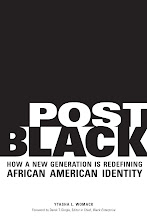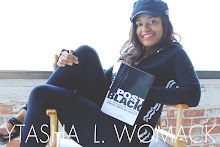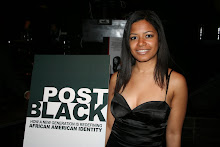Ayanna Maia is a New York based playwright. She is the 2010 Kennedy Center MFA Workshop recipient and won the 2010 Lorraine Hansberry Playwriting Award for her play King N---.
YLW: What is King N—about?
AM: It’s a play about a personification of the last 25 years of hip hop culture. The character goes from boyhood to manhood and he’s holding on to a childhood dream to be a rapper. The play starts in 1987. You see the effects of crack, the effects of capitalism and it all gets filtered through his life. Not to give away too much, but he basically takes on that name as his stage name, and that word as an expression of himself. In modern America, people acculturate and take on different things, and he takes on the word.
YLW: Did you wrestle with using the N word as the title?
AM: I did. I said this is going to be a sore thumb. It came from a reference in another play I wrote. I had to ask ‘what does my play want to be named?’ versus ‘what do I want to call it?’ I remember entering contests and my mom was like, ‘please change the title’. One of my professors, Suzan-Lori Parks, helped me workshop the play. I told her my reservation, but she said if this is your character’s journey and what your character wants then you can’t act out of fear. The play is about his duality and the fact that he thinks he’s a king and a n--- at the same time. I said I have to let go.
YLW: When were you introduced to playwriting?
AM: I got into Gallery 37 in Chicago when I was 13 or 14. I wanted to be in the poetry program but it was full. They called me a few weeks later and said, ‘would you like to write a play?’ My first play won awards. I was the youngest winner ever to win in the Young Playwrights Festival.
YLW: How do you enjoy NYU’s Tisch Dramatic Writing Program?
AM: I was getting another masters, and I left to go to NYU because it was a dream to be in their dramatic writing program. I had Suzan-Lori Parks as my professor, Spike Lee as my professor and advisor. Richard Wesley was my professor, too. And I had Donald Boggle as my professor. Do you know him?
YLW: Yes. He wrote the book on black stereotypes in film.
AM: Right. He wrote Toms, Coons, Mulattoes, Mammies and Bucks: An Interpretative History of Blacks in Films. I had the all-star team in terms of research and media. It was just great to be in their company. They have really lived and expressed themselves in the African Diaspora and universally. I had a wonderful time. I didn’t want to graduate. I just graduated in May.
YLW: Tell me about the Lorraine Hansberry Playwriting Award. Did they stage your play?
AM: I got two awards. One was the Lorraine Hansberry Playwriting Award. They also have the MFA workshop, so they pick six playwrights in grad programs. They did a full scale workshop of the play and they had a staged reading. They brought in professional actors, directors. It wasn’t a full scale production. It was a workshop, but it introduces participants to the theater community. One of the women who participated has a theater in Washington D.C and within weeks she said that she wants to put my play up for the next season. If all goes well, it will have a month long run in D.C in May 2011.
YLW: Exciting!
AM: I‘ve had plays staged, but I’ve never had a full length play with a full scale production.
YLW: Do you hang out with a lot of playwrights?
AM: I know different playwrights, but I find that playwrights are really to themselves. I find playwriting to be very lonely.
YLW: How so?
AM: When you’re sitting there writing 120 pages of another world, you just have to go in and write from what you know, your research and what comes to you. For me, it hasn’t been a collective process. It’s such a deep world when you’re writing different personalities. It’s like doing a research project. Even if you write on your own life, you have to step away. It takes a lot of inner work, and inner work hatches alone.
YLW: Your plays have very strong themes involving black life in the U.S. What do you attribute that to?
AM: Being raised on the Southside of Chicago with parents who were very into the African Diaspora and different cultures, but especially the African Diaspora, coming out of the black arts and black power movement, it makes me very excited about carrying on the traditions of the African diaspora. I worked with the Schomburg Center for Research and Black Culture. I write diverse characters, but my plays are centered on the Diaspora even if all my characters aren’t from there. I love to write comedy. But when it comes to high drama, l like writing about the African Diaspora.
YLW: You also seem to be heavily influenced by hip hop.
AM: It’s funny, for my character, I wrote his rhymes. I grew up in hip hop culture. I mc’d, I recorded. I deejayed. I grew up as a practitioner; I found that when I write plays, I get to have a better experience with hip hop than I’ve ever had in my whole life.
YLW: What do you mean?
AM: I had a lot of misogynistic experiences in hip hop. I’ve had a lot of experiences where I feel the culture is becoming more ignorant. My dad was a DJ, so I remember when hip hop was on vinyl. It was never separate from us. But as females, the older you got there was more of a line. There were fewer female acts, and you have men presenting females, writing their rhymes and it became more sexualized. I’ve written plays about rappers before, but King N-- is the first that got major exposure.
YLW: Many women who grew up with hip hop as a major influence have an awkward relationship with the culture as they mature?
AM: Honestly, when I was younger. I experienced a lot of positive experiences with it in Chicago. There weren’t a lot of female rappers and the guys wanted it to be balanced. The guys I was around wanted to support you. As it came into the 2000s, it was less about the culture and more about the rap game. It was sexualized. I was in an all-female group. I’ve had that duality, I’ve been at a concert where a guy had the whole audience call me a bitch. It’s funny to me, I don’t write as much as I used to. But I still have so much love for the culture itself and the things that comprise it.
YLW: You don’t write as many rap songs as you used to?
AM: I’ll record a song a year.
AM: There’s a play that I just finished writing in May that’s based in Chicago about the chronic street violence among young men. I’ve really been exploring a culture that either encourages or is apathetic to using violence. The murder rate in Chicago and the demographic it’s specific to really bothers me. I’ve had two students in my short teaching career who were murdered. I don’t want children to grow up in a culture where violence is acceptable or where gang culture is the norm, even for those who don’t want to participate in it. The other thing I’ve been exploring is African spirituality and I have a couple of other plays with some magical realism.
For more information of Ayanna Maia go to www.ayannamaia.com
.jpg)










